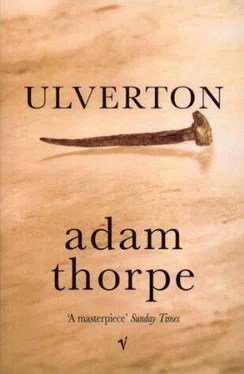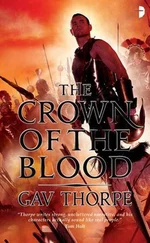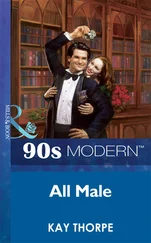Plate XXXV THE VILLAGE SCHOOLMASTER
With his brass spectacles, his starched collar, and his general demeanour of youthful authority, Mr Irvine Leslie, B.A., was an unmistakable pillar of our small but robust community, loudly maintaining that those in his charge were as important to him as any Oxford college. Alas! a back room of the rectory is not conducive to learning, and neither is the absence of books (other than tattered exiles from the vestry cupboard), or paper, or slates, or blackboards; or anything more sophisticated for the inculcation of the very rudiments of the intellectual life, than a ruler with which to crack the three Rs, as it were, into the knuckles of the unfortunates under his care — knuckles more used to the gritty chill of stone and earth, than the warmth of a pencil.
If I seem to berate this gentleman before you now, with his curling smile, his smooth skin, his elegant forelock, his gold-ringed fingers and his shiny silk coat (fitting contrast to the previous portrait), then it is not for his inability to surmount these pecunious obstacles to instruction, whether moral, religious, or scholarly, that I do so; for his very appearance ought to have struck admiration out of the rough green shoots in his care, however irregularly they besought themselves to that dingy room which is christened, by some quirk of meagre endowment, the Ulverton National School for Boys and Girls. No, a very Titan of teachers would have lasted no longer than he did (two years), with likewise no more to show for it than a broken ruler, and some inane parroting of portions of the Book of Common Prayer — one book, to be precise, shared out like the loaves and fishes until each torn page grows too black and greasy to be read at all. No, it is not for his failures — which are not his, but Society’s — that I adopt the stern manner, but his ‘successes’. Fled from a student past of gambling debts and general dissolution, he sought to conceal himself in our pastoral fold, under a respectable wing, and there set about the business of shaking once more that trollop Scandal out of her brief slumber.
Need I say more? Surely not — merely look upon the face my lens has so ruthlessly caught, and see how the corrupt life has slackened the mouth, and watered the eyes, and swollen that handsome nose, yet retained its power to lure the wives of our parish out of their boredoms. Yet as suddenly as he appeared amidst us, reaping his poisonous oats, has he vanished now, not a week after this image was recorded in my studio, not a month prior to my writing these very words — vanished one night after a bout of drinking, vanished like a shadow from our conscience, leaving his belongings, abandoning his conquests, fleeing (no doubt) from that dingy schoolroom, wherein the failure of his moral life must have been daily emblemised in every dusty nook and damp cranny, in every grinding moment of a useless routine, in every bored cough and hideously automatic repetition of our Lord’s golden syllables.
Plate XXXVI THE RECTORY TEA
Far preferable, to my mind, is the human subject when revealed in its natural habitat, than in the studio: how much more possible this is, with the instantaneous brush of the photographer’s art, than with the slow dab of the painter’s! The Reverend Walter Willington, seen here resting from his spiritual responsibilities in the shrubberied glory of the rectory garden, is a remarkable testimony to the healthy nature of a life devoted to quiet worship and devotion to others: he has been rector in the parish of Ulverton for over fifty years — and now, in his eightieth year, the grandchildren of those he once baptised, are in turn wetted at his hands over the ancient font. When he first came, so lamentably attended to was the church, that on striking the lectern for emphasis during his first sermon, the resultant cloud of dust quite hid him from view. Now the perfume of beeswax prevails, a fine new organ has been installed, and a bag of mint humbugs in the vestry is quite emptied each Sunday, so pressing are the numbers of children that worship.
I choose this picture among many I have taken from the Church brethren amongst us, for its peculiar air of peace: innumerable are the times I have sat as a guest at this very table, in this very same creepered corner of the rectory garden, blooming with lilac, and wished myself to be in no other place but Heaven, were this pouring of the tea to continue for eternity. Only the clamour of the rooks in the graveyard oaks, and the murmur of bees clustering at the foxgloves, and the chimes of crockery — only these tell us we are hurrying on, for the shadow upon the sun-dial fools us it is stilled; while the breeze from the downs ripples through unceasingly, with its hint of grass, and corn, and the faint bells of flocks, moving like flecks of foam upon a green wave.
If higher mortals scoff at my celebration of this parochial encumbrance to novelty and brilliance, to the pursuit of innovation and enterprise, huffing and puffing on its gleaming tracks, then let me say only that life cannot always be moving post-haste until it take our breath away, and fill our eyes with smuts, but that stillness and pause are the essence of struggle, and the pith of sobriety. Let the calm of this humble scene, in which the old stone dial (and its motto) serves as our admonition, be as water that settles the dust upon a highway, and slakes the soul.
And so we bid adieu to our English village, slumbering on in its quiet valley, far from the city and its peculiar wants. Let these twenty-four scenes remain as a portrait faithful to an institution that has grown, not as a railway grows — in dust and curses, in mathematical gauging and ruthless application — but as a nurtured seed, that buds too slow to notice, and yet breaks the frost. That is not sown on the wind, but in the rich tilth of an unrecorded history, plodding on between an English earth and an English sky.
Plate XXXVII EXCAVATION, EGYPT (GENERAL SCENE)
It was with profound delight and honour that I accepted the invitation last winter, from Mr H. Wallis Dobson, to accompany his team in their excavation of an Egyptian tomb complex, at a site I must refrain from disclosing, lest the riches therein be garlanded by other than the British Museum. The subject of the following ten plates is a site from which no gold has been discovered, but rather the priceless metal of the painted image: scene after scene decorates the walls, as freshly coloured as the day, millenniums past, the hand of the tomb painter applied his brush by the flickering tallow.
It may be of interest to note, how industrious the scene is, with its ladders and spades and earth-spills and boxes, its army of Arabian helpers, stripped to the waist in the blazing sun, its dusty air of application — as if a building was being constructed, or the underground railway of Sir John Fowler were being dug into the sand of Egypt, not the clay of London! This was a surprise to me, who had always imagined excavations to be quiet affairs — of one or two bespectacled scholars, handkerchiefs upon their heads, scraping with a trowel in the studious concentration of a library sojourn. May this plate, then, lighten the ignorance of others, as well as myself, and serve as introduction to the images of the far past these heroic individuals revealed to daylight, after unimaginably lengthy time.
Mr Wallis Dobson may be seen in the middle of the picture, with a paper (it is a map — a magnifying glass, essential for the perusal of plates, reveals this clearly) and the clean-shaven young man to his right is Mr Stephen Quiller, his young assistant — an acknowledged expert in the decoration of ancient tombs.
Plate XXXVIII TOMB-MOUTH
The peculiarly harsh light of the Middle East presents a challenge to the photographer (I need not mention the problems of fine blown sand in the mechanism, or indeed — I may add with feeling — of cholera) that is only overcome by an equally harsh adjustment of one’s prior conclusions, arrived at in the soft, wet light of England. I saw, when perusing this subject, how the glare of the desert, and the deep darkness of the tomb’s interior, stood in threatening contrast — so forceful that the image might have vanished completely into mere patterns of light and shade, as unintelligible as newsprint in a foreign country.
Читать дальше










